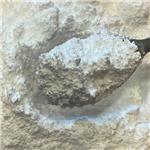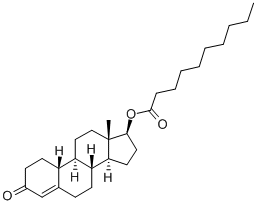Effect of Nandrolone Decanoate Therapy on Weight
Oct 29,2019
Background Weight loss is associated with accelerated mortality and disease progression in patients with human immunodeficiency virus (HIV) infection. Although studies have examined a variety of anabolic therapies in HIV-infected men, the safety and efficacy of such treatments in women have not been adequately studied.
Methods In this randomized, double-blind, placebo-controlled, multicenter, phase I/II study, 38 HIV-infected women with documented weight loss of 5% or greater in the preceding year or a body mass index of less than 20 kg/m2 were randomized to receive nandrolone decanoate (100 mg) or an equivalent volume of placebo every other week by intramuscular injection. Subjects received blinded treatment for 12 weeks, followed by open-label therapy for 12 weeks. Lean body mass and fat (bioelectrical impedance analysis) and weight were measured at baseline and at weeks 6, 12, 18, and 24. Biochemical assessments of safety (hematologic analyses, liver function tests, and sex hormone measurements) were performed at these same time points. Clinical signs and symptoms were monitored biweekly.
Results Subjects randomized to receive nandrolone had significant increases in weight and lean body mass during blinded treatment (4.6 kg [9.0%] and 3.5 kg [8.6%], respectively; P<.001 vs baseline and placebo in each case). Fat mass did not change statistically significantly in either group. Although there were no statistically significant differences between groups in biochemical measures, the number of grade 3 or greater toxicities, or reports of virilizing effects, a full assessment of safety cannot be made in a trial of this size.

Conclusion
Nandrolone decanoate therapy may prove to be generally safe and beneficial in reversing weight loss and lean tissue loss in women with HIV infection and other chronic catabolic diseases.
W asting has been associated with increased risk of mortality and morbidity in patients with human immunodeficiency virus (HIV) infection, even in the current treatment era.1-4 Although the incidence of HIV-associated wasting has declined in populations with widespread access to highly active antiretroviral therapy (HAART),5-7 wasting persists in some patients undergoing HAART.8 Moreover, weight and lean body mass (LBM) are not consistently restored after the initiation of HAART.9,10 Although studies have examined the safety and efficacy of a variety of anabolic therapies in men, treatment options have not been adequately studied in women.
Nandrolone decanoate is an injectable derivative of 19-nortestosterone that is approved by the Food and Drug Administration as a treatment for anemia in men and women with chronic renal failure. Treatment with nandrolone has been associated with increases in LBM in men and women with chronic renal failure11 and in postmenopausal women.12,13 Despite considerable off-label use of nandrolone in patients with HIV infection, limited data are available regarding its safety and efficacy in HIV-positive men, and none are available in HIV-positive women. In open-label studies14-17 in HIV-infected men, nandrolone use has been associated with increases in weight and LBM. We report herein the first study of nandrolone dec-anoate therapy in HIV-infected women with weight loss.
Background Weight loss is associated with accelerated mortality and disease progression in patients with human immunodeficiency virus (HIV) infection. Although studies have examined a variety of anabolic therapies in HIV-infected men, the safety and efficacy of such treatments in women have not been adequately studied.
Methods In this randomized, double-blind, placebo-controlled, multicenter, phase I/II study, 38 HIV-infected women with documented weight loss of 5% or greater in the preceding year or a body mass index of less than 20 kg/m2 were randomized to receive nandrolone decanoate (100 mg) or an equivalent volume of placebo every other week by intramuscular injection. Subjects received blinded treatment for 12 weeks, followed by open-label therapy for 12 weeks. Lean body mass and fat (bioelectrical impedance analysis) and weight were measured at baseline and at weeks 6, 12, 18, and 24. Biochemical assessments of safety (hematologic analyses, liver function tests, and sex hormone measurements) were performed at these same time points. Clinical signs and symptoms were monitored biweekly.
Results
Subjects randomized to receive nandrolone had significant increases in weight and lean body mass during blinded treatment (4.6 kg [9.0%] and 3.5 kg [8.6%], respectively; P<.001 vs baseline and placebo in each case). Fat mass did not change statistically significantly in either group. Although there were no statistically significant differences between groups in biochemical measures, the number of grade 3 or greater toxicities, or reports of virilizing effects, a full assessment of safety cannot be made in a trial of this size.
Conclusion Nandrolone decanoate therapy may prove to be generally safe and beneficial in reversing weight loss and lean tissue loss in women with HIV infection and other chronic catabolic diseases.
W asting has been associated with increased risk of mortality and morbidity in patients with human immunodeficiency virus (HIV) infection, even in the current treatment era.1-4 Although the incidence of HIV-associated wasting has declined in populations with widespread access to highly active antiretroviral therapy (HAART),5-7 wasting persists in some patients undergoing HAART.8 Moreover, weight and lean body mass (LBM) are not consistently restored after the initiation of HAART.9,10 Although studies have examined the safety and efficacy of a variety of anabolic therapies in men, treatment options have not been adequately studied in women.
Nandrolone decanoate is an injectable derivative of 19-nortestosterone that is approved by the Food and Drug Administration as a treatment for anemia in men and women with chronic renal failure. Treatment with nandrolone has been associated with increases in LBM in men and women with chronic renal failure11 and in postmenopausal women.12,13 Despite considerable off-label use of nandrolone in patients with HIV infection, limited data are available regarding its safety and efficacy in HIV-positive men, and none are available in HIV-positive women. In open-label studies14-17 in HIV-infected men, nandrolone use has been associated with increases in weight and LBM. We report herein the first study of nandrolone dec-anoate therapy in HIV-infected women with weight loss.
- Related articles
- Related Qustion
- Pharmacodynamics and Toxicity of Nandrolone decanoate Aug 8, 2022
Nandrolone decanoate, or nandrolone 17β-decanoate, is a synthetic estrane steroid and a derivative of testosterone.
- What is Nandrolone decanoate? Aug 20, 2021
Nandrolone decanoate, also known as nandrolone caprinate, is an alkylated anabolic steroid indicated in the management of anemia of renal insufficiency and as an adjunct therapy in the treatment of senile and postmenopausal osteoporosis.The
Resveratrol is a chemical found in red wine, red grape skins, purple grape juice, mulberries, and in smaller amounts in peanuts. It is used as a medicine. Resveratrol is most commonly used for high cholesterol, cancer, heart disease, and m....
Oct 29,2019APISince the late 1960s, there’s been controversy surrounding the health effects of carrageenan. Some evidence suggests that carrageenan triggers inflammation, gastrointestinal ulcerations, and that it damages your digestive system. People hav....
Oct 29,2019Biochemical EngineeringNandrolone Decanoate
360-70-3You may like
Nandrolone Decanoate manufacturers
- DECADURABOLIN
-

- $5.00 / 1Box
- 2025-06-11
- CAS:360-70-3
- Min. Order: 1Box
- Purity: 99.99%
- Supply Ability: 20000 boxes
- NANDROLONE DECANOATE
-

- $5.00 / 1Box
- 2025-06-11
- CAS:360-70-3
- Min. Order: 1Box
- Purity: 99.99%
- Supply Ability: 20000 boxes
- Nandrolone Decanoate(DECA)
-

- $5.00 / 1Box
- 2025-06-11
- CAS:360-70-3
- Min. Order: 1Box
- Purity: 99.99%
- Supply Ability: 20000 boxes






